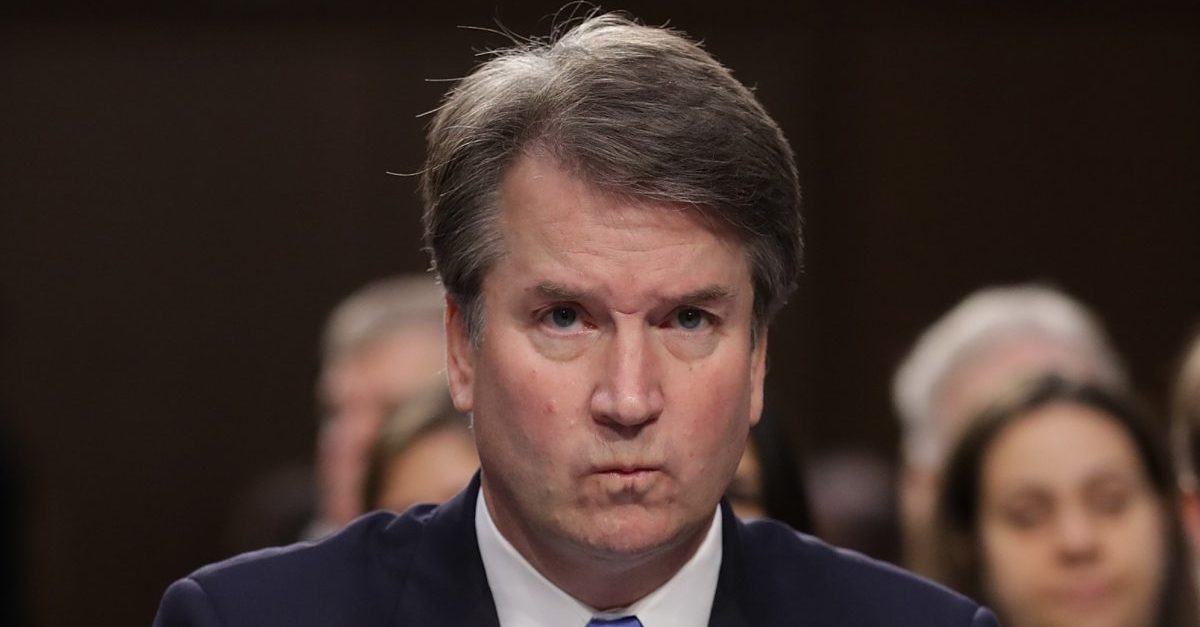
The Brett Kavanaugh news cycle has ramped up again as it’s being reported that Sen. Dianne Feinstein has forwarded a letter she received to the FBI about “possible sexual misconduct” between Kavanaugh and a woman back in high school. This raises a few obvious questions, especially about the timing of it all.
As Law&Crime reported earlier, a California woman reportedly sent a letter to Rep. Anna Eshoo (D-Calif.) about Kavanaugh. Eshoo then forwarded this letter to Sen. Dianne Feinstein (D-Calif.). Feinstein has since referred this letter to the FBI, a fact confirmed by other Democrats.
“I have received information from an individual concerning the nomination of Brett Kavanaugh to the Supreme Court. That individual strongly requested confidentiality, declined to come forward or press the matter further, and I have honored that decision,” Feinstein said in a statement. “I have, however, referred the matter to federal investigative authorities.”
This raises the question of whether Feinstein is going against the unidentified woman’s wishes by forwarding this the FBI.
That aside, now the New York Times is reporting some additional details that raise even more obvious questions, especially one as basic as “Why now?” The Times reports that the letter addresses “possible sexual misconduct between Judge Kavanaugh and a woman when they were both in high school.”
How long has Feinstein been sitting on this letter? Feinstein reportedly received the letter “this summer,” but only told Senate Judiciary Committee Democrats on Wednesday evening. After fellow Democrats said she should go to the FBI, she did so.
Law&Crime reached out to a representative for Rep. Eshoo to ask when Eshoo sent the letter to Feinstein, but there has at this time been no response to the inquiry.
Meanwhile, BuzzFeed, as made plain in its own reporting, was aware of this story as early as last week — and apparently knew the identity of the woman.
Whose fault is this?
Not only that, but BuzzFeed believed they’ve identified the woman’s lawyer as Debra Katz.
The lawyer believed to be representing the woman was seen leaving Capitol Hill Wednesday evening shortly after the Intercept story dropped and just as Judiciary Committee Democrats were huddling in the Senate lobby. The lawyer, Debra Katz, has not confirmed that she is representing the woman. She also declined to comment Wednesday, saying, “There’s nothing to say.”
Bear in mind that, as the Times also noted, this news dropped “after the Senate Judiciary Committee, in a series of party-line votes, rejected Democrats’ efforts on Thursday to subpoena documents and testimony into Judge Kavanaugh’s years as a top White House aide under President George W. Bush.”
It’s hard not to view this, to some degree, as retaliation for that.
The White House has already pushed back on the story on the grounds of the timing.
“Not until the eve of his confirmation has Sen. Feinstein or anyone raised the specter of new ‘information’ about him,” White House spokesperson Kerri Kupec said. “It appears [Sen. Chuck Schumer] is delivering with this 11th hour attempt to delay [Kavanaugh’s] confirmation.”
Indeed, this is also happening during a lull of sorts on the Kavanaugh front. It comes after the tense and circus-like congressional hearings and just before the actual vote of whether to confirm him.
The vote has been pushed back to Sept. 20.
Another question related to all of this is whether this is a way to apply political pressure on Sen. Susan Collins (R-Maine), whose vote would swing things the other way Kavanaugh. Collins, styling herself as a moderate, suggested before that she was given pause by Kavanaugh’s views on Roe v. Wade, but thought differently when he said it was “settled law.”
This kind of pressure on Collins is already out there in a different form.
Law&Crime’s Ronn Blitzer has already explored another question: Why go to the FBI?
[Image via Chip Somodevilla/Getty Images]